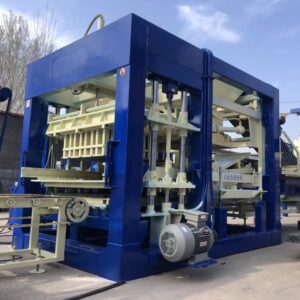
The construction industry has been undergoing a remarkable transformation in recent years, largely driven by advancements in technology.
One of the most significant innovations in this realm is the evolution of concrete block machines.
These machines have played a pivotal role in shaping modern construction practices by providing efficient and sustainable solutions for producing building materials.
This essay delves into the latest advancements in concrete block machines, exploring how they are revolutionizing the construction landscape.
Automation and Precision: Redefining Manufacturing Processes
The advent of automation has brought about a paradigm shift in various industries, and the construction sector is no exception.
Concrete block machines have embraced automation to redefine the manufacturing processes of building materials.
Traditional methods of producing concrete blocks were labor-intensive and often prone to human errors, leading to inconsistencies in quality.
However, with the integration of automated systems, these machines can now produce uniform and high-quality blocks with precision.
Advanced concrete block machines are equipped with computerized controls and sensors that regulate the mixing, molding, and curing processes.
These machines can precisely measure and mix raw materials, ensuring the right proportions for optimal block strength.
Additionally, automated molding systems create blocks with consistent shapes and sizes, minimizing waste and maximizing structural integrity.
The result is a streamlined manufacturing process that accelerates construction timelines and reduces costs.
Sustainable Practices: Green Building with Concrete Block Machines
In an era of increasing environmental awareness, sustainable construction practices have gained paramount importance.
Concrete, a widely used construction material, has traditionally been associated with significant carbon emissions due to the energy-intensive manufacturing process of cement.
However, recent advancements in concrete block machines have introduced greener alternatives that align with the principles of sustainable construction.
One notable development is the utilization of recycled materials in block production.
Advanced machines can incorporate supplementary cementitious materials such as fly ash, slag, or even recycled concrete into the mix.
This not only reduces the demand for virgin raw materials but also diminishes the carbon footprint of the construction process.
Furthermore, the improved efficiency of modern concrete block machines results in less energy consumption during manufacturing, contributing to overall energy savings.
Customization and Versatility: Meeting Diverse Construction Needs
Every construction project comes with its unique requirements, and adaptability in construction materials is crucial to meeting these diverse needs.
Contemporary concrete block machines offer an unprecedented level of customization and versatility, enabling builders to create blocks with specific attributes tailored to the project’s demands.
Advanced machines allow for the incorporation of additives and admixtures into the concrete mix.
This means that blocks can be engineered to possess specific properties, such as enhanced insulation, increased load-bearing capacity, or improved fire resistance.
This level of customization not only enhances the overall performance of buildings but also paves the way for innovation in architectural design.
From soundproofing to earthquake resistance, these adaptable blocks are transforming the way structures are conceived and constructed.
Data-Driven Insights: Enhancing Construction Efficiency
Data has become a cornerstone of efficient decision-making in virtually every industry.
The construction sector, traditionally perceived as labor-centric, is now embracing data-driven insights to optimize project management and resource allocation.
Concrete block machines have joined this data revolution by incorporating smart technologies that provide real-time information on various aspects of the manufacturing process.
Modern concrete block machines are equipped with sensors that monitor factors such as material consistency, vibration frequency, and curing conditions.
This data is then analyzed to identify patterns and deviations, enabling operators to make informed adjustments in real time.
Predictive maintenance algorithms also help prevent unplanned downtime by flagging potential issues before they escalate.
These data-driven capabilities not only improve the efficiency of block production but also contribute to more accurate project planning and resource utilization on construction sites.
The construction industry stands at the cusp of a technological renaissance, with concrete block machines leading the way as a prime example of innovation.
The latest advancements discussed in this essay highlight the profound impact of automation, sustainability, customization, and data-driven insights on revolutionizing construction practices.
As these machines continue to evolve, they promise to reshape the way buildings are constructed, making the process faster, greener, more adaptable, and ultimately, more efficient.
With the convergence of technology and construction, the future holds exciting possibilities for both builders and the built environment.
